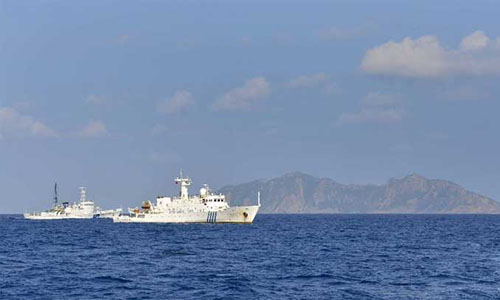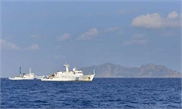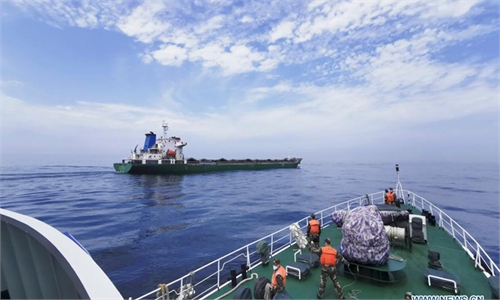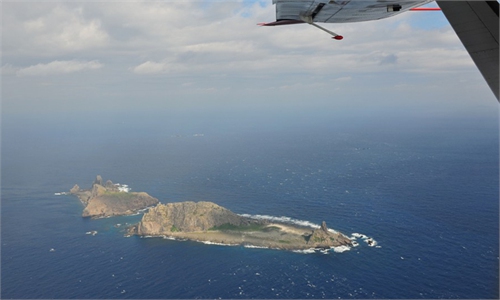
The China Marine Surveillance ships patrol around the Diaoyu Islands, October 25, 2012. Photo: Xinhua
China passed its coast guard law in January. The dual role of China's coast guard as law enforcement and being authorized to use weapons has caught attention. Some hyped that China is militarizing its coastguard, claiming that law enforcement and use of force by China's coast guard will pose a serious threat to regional peace and stability. This accusation is baseless.The dual role means that the coastguard enforces law as an administrative task and is part of the armed forces during wartime. First, from the perspective of the definition of the duties and rights of coast guards of each country, China's legislation is in line with international practices. China's coast guard law stipulates: "The People's Armed Police Force's Coast Guard, that is, the coast guard organization, shall uniformly perform maritime rights enforcement duties." It also stipulates that the coast guard "shall carry out defense operations and other missions in accordance with the National Defense Law, the Armed Police Law, and other relevant laws, military regulations, and orders of the Central Military Commission."
Similarly, the coast guard law in many countries authorizes the dual role of their coast guards.
In the US, the Coast Guard is defined by Title 14 of the United States Code, the Coast Guard "shall be a military service and a branch of the armed forces of the United States at all times. The Coast Guard shall be a service in the Department of Homeland Security, except when operating as a service in the Navy."
The Australian Coast Guard Bill says that the Australian Coast Guard is member of the Australian Federal Police and "In times of war, the Australian Coast Guard will come under the direct command of the Australian Defense Force."
According to the law on the Vietnam Coast Guard, "the Vietnam Coast Guard is a people's armed and specialized force of the State, which plays a key role in law enforcement and protection of national security and order and safety on the sea."
The Philippines Coast Guard Law of 2009 states that "the Philippine Coast Guard is established as an armed and uniformed service attached to the Department of Transportation and Communications… In times of war… the PCG or parts thereof, shall be attached to the Department of National Defense."
It is also provided in the Malaysian Maritime Enforcement Agency Act 2004 that "… the Agency… shall be under the general command and control of the Armed Forces of Malaysia during any period of emergency, special crisis or war."
Second, the coast guards of many countries are equipped with ships and weapons, thus China's practice is also in line with prevailing international practice. Take the US Coast Guard (USCG) as an example: a huge part of its ships are warships equipped with naval guns, machine guns, heavy machine guns and other weapons. These warships can carry helicopters and unmanned aerial vehicle systems. In wartime, they can be quickly equipped with weapons with greater lethality. The physical nature of the USCG is armed forces; as a result, the USCG naturally has a duality. Even though the coast guard forces of the Philippines, Vietnam, Japan and other countries are not as strong as the USCG, or the so-called the US Second Navy, the coast guards of these countries are also equipped with warship-class ships and shipboard weapons. Moreover, it is the military of countries such as the UK, Italy, and France that directly performs the functions of the coast guard and carries out maritime law enforcement tasks.
Thus, it is not difficult to see that China's coast guard law completely accords with common international practices and conventions. The criticisms from the outside world are totally unreasonable. Making a one-sided emphasis on the military nature of the Chinese coast guard is obviously a move to play dumb. But if they can successfully confuse right from wrong, their next step will be to maliciously treat any law enforcement actions of the Chinese coast guard as pure military moves, and claim they have more solid proof of the so-called China threat theory and to smear that China is seeking maritime hegemony.
It is time to raise the same question to other countries with a similar coast guard to China's - are your moves a military action? Such double-standard treatment poses unfair competition with countries with a different development path. It shows that some countries are burying their heads in the sand.
The author is an observer of international affairs. opinion@globaltimes.com.cn



